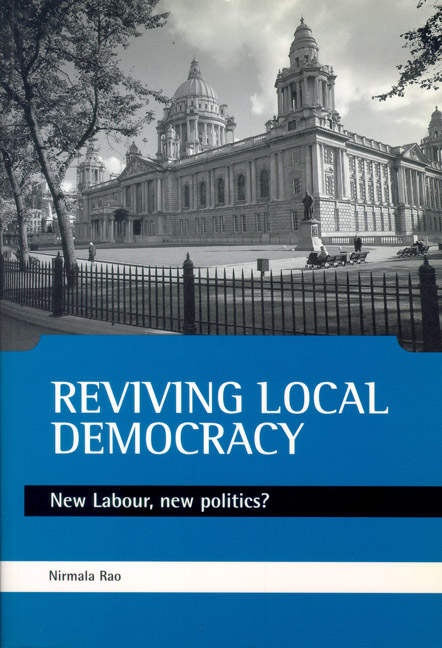Book contents
- Frontmatter
- Contents
- List of tables
- Acknowledgements
- one New times for local democracy
- two Local democracy and after
- three The failed promise of reform
- four Civic-minded Britain?
- five The reluctant voter
- six The third way and democratic reform
- seven The modernising agenda: enhancing participation
- eight The modernising agenda: new forms of political leadership
- nine Prospects for a new politics
- Bibliography
- Appendix A The surveys
- Appendix B The legislation
- Index
four - Civic-minded Britain?
Published online by Cambridge University Press: 05 July 2022
- Frontmatter
- Contents
- List of tables
- Acknowledgements
- one New times for local democracy
- two Local democracy and after
- three The failed promise of reform
- four Civic-minded Britain?
- five The reluctant voter
- six The third way and democratic reform
- seven The modernising agenda: enhancing participation
- eight The modernising agenda: new forms of political leadership
- nine Prospects for a new politics
- Bibliography
- Appendix A The surveys
- Appendix B The legislation
- Index
Summary
By the late 1960s, British political culture, with its traditional respect for government and trust in governmental authority, was showing signs of change. Much more sceptical and assertive attitudes were becoming apparent, reflected in a greater willingness to protest against any disagreeable government action. Alongside the emergence of these more assertive public attitudes towards both central and local government, came a societal shift towards greater fragmentation and diversity, fostering a new style of politics which, in its sectionalism, sat uneasily with the established mechanisms of local representative democracy. These changes were not confined to Britain. From the 1970s, the western world as a whole experienced a similar shift in modes of participation, from formal electoral politics to single issue activism. They were to prove to have great significance for the workings of local democracy.
The culture shift
Local democracy in any country crucially depends for its working on the cultural setting within which it subsists, and of which it is inescapably a creation. ‘Culture’ is about the attitudes, values, knowledge and propensities that are shared within a society and transmitted from generation to generation. Major changes in social conditions may bring about shifts in a culture, but generally change comes about only through the succession of one generation by another. The possibility of this fluidity in a culture will, from time to time, create problems for governmental institutions, for they themselves are the products of another time and of other values. Rigidity rather than adaptation is likely to be the norm.
The idea of political culture
Political cultures are sets of values, beliefs and emotions that give meaning to political behaviour, create dispositions for people to behave politically in particular ways and provide justifications for them (Kavanagh, 1985, p 46). They concern the manner in which social attitudes and values shape people's political conduct. The concept itself has become an indispensable element in the modern political imagination, displacing the earlier usage of national character. It offers a richer and fuller insight untrammelled by the limits and distortions that result from projecting the moral nature of the individual on to the national scene, in order to calculate the attributes of the public. As such, political culture tends to be seen in such terms as a particular distribution of political attitudes, values, feelings, information and skills.
- Type
- Chapter
- Information
- Reviving Local DemocracyNew Labour, New Politics?, pp. 67 - 92Publisher: Bristol University PressPrint publication year: 2000



